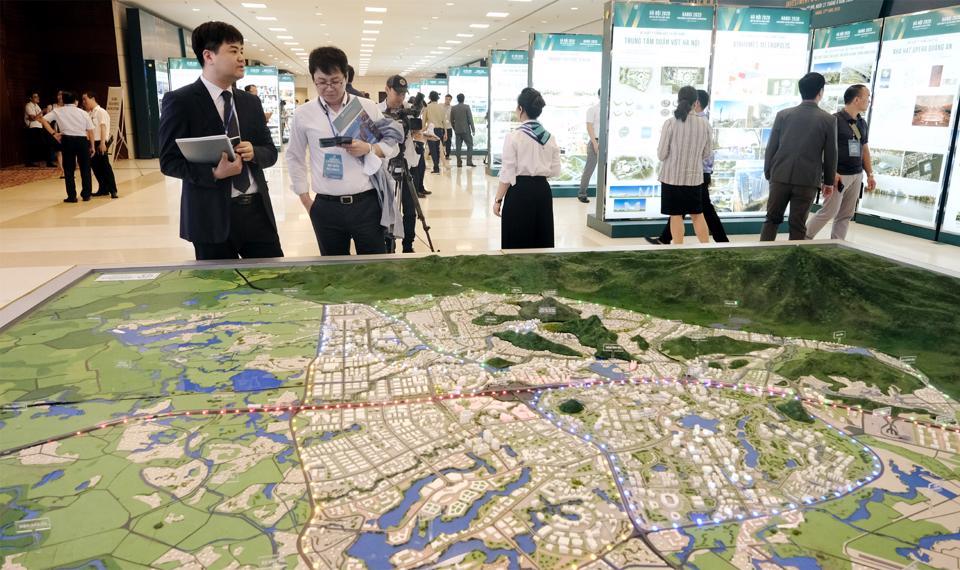Public participation key for Hanoi’s planning
The authorities are expected to take a more active role in helping locals better understand their role and responsibility in every planning process, in order to end up contributing their share to the city’s development.
Experts have stressed the necessity for greater public participation during the planning process, seen as key to raising its quality and practicality.
| Locals look at Hanoi's planning model. Photo: Pham Hung |
In practice, such a process could be a decisive factor in whether planning would be successfully implemented or not.
For over 20 years, the construction of the Ha Dinh Park at Ha Dinh Ward, Thanh Xuan District, has not been able to start, causing inconvenience for people in the surrounding areas.
The main reason for the delay was the disagreement between the locals and the authorities, as the planning for Ha Dinh park overlapped 649 land plots that the city has allocated for residents since 1993.
This was an example of the lack of public consultation during the planning process, leading to difficulties in the project execution.
Former Director of the Infrastructure Department under the Ministry of Construction Nguyen Hong Tien said in many countries such as developing nations such as Thailand, Indonesia, Ghana, and Ethiopia, the authorities have gone to great lengths to incorporate public opinion in planning, construction, and urban management.
"Public participation holds a key role in improving the quality of planning and its feasibility, at the same time raising the awareness and responsibility of locals in carrying out planning," Tien told The Hanoi Times.
In Vietnam, the role of public consultation has been recognized in several laws, including the Law on Construction, Law on Urban Planning, and Land Law, but in fact, the process of seeking public opinion in planning has not been as expected, Tien added.
Hurdles required to resolve
Director of the Hanoi Urban Planning Institute Luu Quang Huy attributed the issue to the vague regulation regarding public participation in such laws. There is a lack of detailed instruction regarding the planning scale, qualification of people or the approval rate required in any planning process.
"The majority of consultants responsible for the planning process draw up their forms to seek public opinion," Quang told The Hanoi Times.
According to Quang, this would become a significant issue for projects spanning multiple provinces/cities that relate to different administrative units and population segments.
Sharing the view, Vice President of the Vietnam Urban Planning and Development Association Dao Ngoc Nghiem noted public participation is essential in every planning process and is provided by the law.
However, to prevent this process from being superficial, Nghiem called for the authorities to set up a clear protocol and define the eligibility of people participating in public consultation.
Nghiem applauded the efforts of Hanoi in this regard, especially during the Old Quarter's planning, French street zones, or surrounding areas of the Sword Lake and West Lake, via planning exhibition or sociological survey.
"In particular, Hanoi has even sought opinions from international and non-governmental organizations for the planning of the Old Quarter," he told The Hanoi Times.
Nevertheless, Nghiem pointed out the lack of feedback between the public and the authorities to reach a consensus.
"In most cases, people only know about the orientation of the planning and do not understand their roles in such process," Nghiem added.
Nghiem said the issue is essential, as Hanoi is drafting the overall planning for the 2021-2030 period, covering multiple sectors, fields, and different social groups.
"The city must continue to raise people's awareness of the direction of the planning process rather than leaving people to seek information on their own. Only in this way can the residents be sure of their role and responsibility in the planning process and ultimately in the development of Hanoi," Nghiem stressed.












